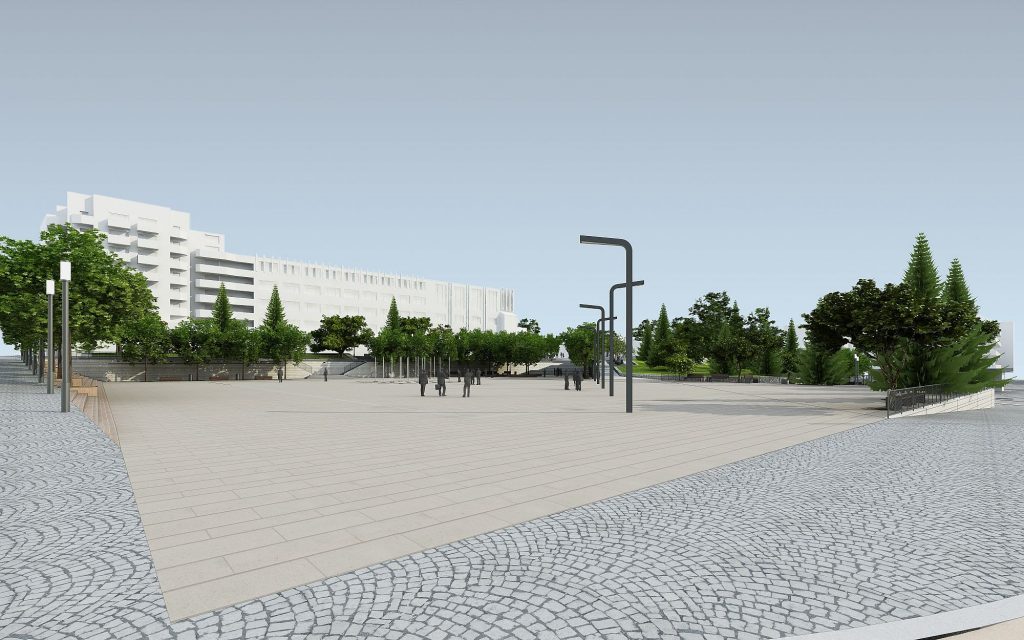Text: Ştefan Ghenciulescu
This is a serious and old problem and one ware have discussed on may occasions. But this particular text was triggered by two events.
Firstly, it just happened that, without noticing it until quite recently, a lot of materials in this issue , in some way relate to the topic of competitions. There are direct articles on competitions—“Prototype for Community” or the European stage of LafargeHolcim Awards, but also indirect ones, presenting good works, resulted from winning a competition.
The Lacaton & Vassal’s beautiful and generous intervention on a social dwellings complex compares to the pseudo thermal rehabilitation in Romania pretty much to the same degree as the French competition system next to the sinister tendering procedure used by our authorities most of the times for commissioning projects.
 *Lacaton & Vassal: rehabilitation of a social housing ensemble, Bordeaux ©Phillippe Ruault
*Lacaton & Vassal: rehabilitation of a social housing ensemble, Bordeaux ©Phillippe Ruault
Topophilia Pavilion of Seoul and the development of the central public space in Ramnicu Valcea are, however, resulted from genuine national competitions, endorsed by the Romanian Chamber of Architext. We did not see it as publishing (former) competition projects, but as showcasing good architecture.
The second event is related to the recently completed NOVEMBarh, a workshop where hundreds of architects from Ro¬mania participated voluntarily and debated, in dedicated teams on clear topics, substantive issues for the profession: legislation of all sorts, ethics, fees and entrepreneurship, access to practice, the disaster of authorizations and notices, etc. There was also supposed to be a team on competitions: however, so few people have signed up, that it was cancelled.
It is somewhat understandable: there are so few competi¬tions (and not even all having a concrete result), that their effect in terms of projects, compared to the number of architects, is close to 0. And then, it is not easy to survive as an architect in a post socialist Romania. We have big and endless issues in our everyday professional activity, so that the feeling is that in fact a competition is a luxury, something not concerning most of us, those with small projects. I’m not saying “us” in a rhetorical man¬ner: within Zeppelin or in our quasi permanent partnerships, we are working on small scale, and sometimes tiny scale architec¬ture and design projects; we have not participated in a very long time in an commission awarding competition. Which does not prevent us from passionately supporting them.
Putting aside the issues related to quality, prestige, value, etc., I would say that there are two big reasons for this, both having implications on each and everyone of us:
On the one hand, competitions are pretty much every¬where the only chance for young architects, and in general, for small and medium offices, to reach important commissions and first of all, public projects. Do we only want to make tiny houses and developments?
On the other hand, there is an iron rule: a good mass architecture (based not solely on good architects, but on many willing and open customers) only exists in countries with good public architecture. One does not create a relevant architectural phenomenon and a top general practice only by private projects. Anywhere. And, with the exception of some rich autocratic regimes that order works and import architects as they please, a country’s good public architecture categorically needs a competition system. This is what happens in Spain, Switzerland, Germany, the Nordic countries,… Or Croatia, closer to us, both geographically and through the recent history. Good public architecture creates a good image, makes waves, educates, gives models, builds a pretentious public, gives us prestige, as a profession. In Romania, the dominant architecture model is the House of the People.
Well, it is clear that we need better competitions. In order for them to be better and better judged, they should also be more. And then the failed ones, of which we now all speak, will no longer be as relevant as a percentage. We will be more relaxed, we will participate in greater numbers and we shall start from other premises from the discussions with the customers and the society. Perhaps we won’t even be sees as disposable, or even useless by the powers that be.
There is a great deal to discuss and to do. But regarding the competitions as something “elitist”, not so important, dropping them altogether, explicitly or otherwise, that would be suicidal. Even out of a purely personal interest.
 *Refurbishment of the central public space in the city of Râmnicu Vâlcea. The winning project of the competition organized by the City Hall and the Order of Romanian Architects ©Radu Malașincu
*Refurbishment of the central public space in the city of Râmnicu Vâlcea. The winning project of the competition organized by the City Hall and the Order of Romanian Architects ©Radu Malașincu


